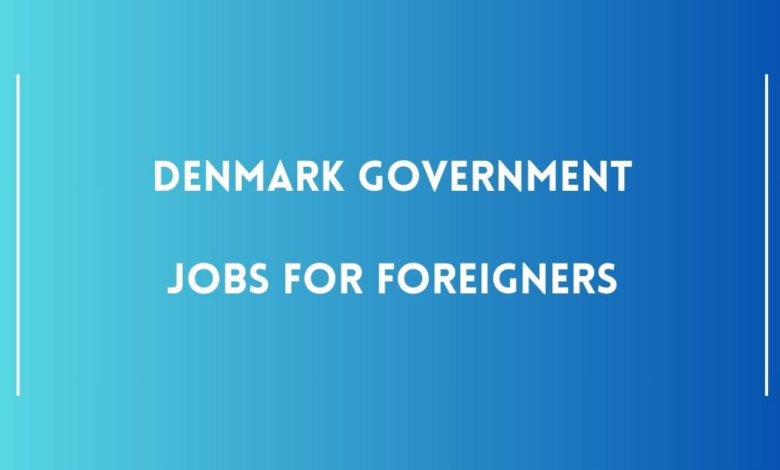Denmark Government Jobs for Foreigners 2024 – Apply Now

Obtaining employment in Denmark has become incredibly straightforward, with hundreds of positions readily available. The purpose of this article is to provide an overview of several well-known employment opportunities in Denmark, including their requirements and average salaries.
Check Also: Denmark Visa Sponsorship Jobs for Foreigners 2024
List of Denmark Government Jobs for Foreigners
Due to its small population of nearly 6 million, employment opportunities in Denmark may appear challenging for foreign nationals. However, there is good news: Danish employers are permitted to hire foreign workers with exceptional abilities or specialized knowledge that is uncommon in the country.
Hotel Jobs in Denmark
Numerous accommodations and dining establishments in Denmark are currently recruiting for positions such as executive chefs, dishwashers, sanitation specialists, and chefs. If you are interested in attempting your hand at serving Danish cuisine in a capacity such as a chef, chief chef, server, or secretary, then this article is for you. In addition to possessing communication skills, CPR/first aid certification, and chef certification, candidates must also be adept at following recipes, introducing details, and refining and maintaining organizational abilities.
To be eligible for employment as a sanitation specialist or dishwasher at a lodging establishment in Denmark, applicants must have at least a high school diploma and relevant work experience.
If you are currently interested in learning more about the typical salary of a chef at a Danish inn, please continue reading. Chefs typically earn between $14 and $25 per hour, and as the executive chef, you will earn between 648,762 and 370,189 DKK annually. Average monthly compensation for a dishwasher ranges from 5,260 DKK to 15,500 DKK, while housekeeping specialists earn an average of 276,928 DKK annually.
Prominent accommodations for professionals in Denmark include the renowned inn by the Radisson Collection, the Copenhagen Marriott lodging, the Lodging D’angleterre, and the Nimb Hotel.
Aviation Occupations in Denmark
Denmark is a highly competitive market for airlines and flying-related professions, with numerous companies seeking cabin crew, pilots, security personnel, ATC tower staff, ground staff, and more. To qualify for cabin team employment, candidates must meet the following criteria: a minimum age of 18 years, a valid EU/SWISS/EEA visa, auxiliary training, and a minimum height of 180 cm. To operate a Danish aircraft, one must possess an EASA permit and demonstrate English proficiency with a substantial lesson 1 restorative. In addition to a high school diploma, ATC tower positions require teaching experience, comprehensive knowledge of EASA, and an ATCO-prepared certification in order to be considered for the position.
The standard compensation for cabin crew members in Denmark is 504,300 DKK annually, while pilots receive 68,300 DKK per month. In addition to receiving 604,089 DKK as an ATC, you will also benefit from an annual reward of 16,386 DKK.
The most reputable Danish airlines and companies are SAS, Uni-fly Denmark, and Naviair, and their websites contain encouraging information.
Jobs in Healthcare
If one wishes to gain additional practical experience, hospitals in Denmark provide a diverse range of positions across multiple departments. An individual desiring employment as a nurturer should possess a BSc in nursing, a registered nursing certification, a curriculum vitae or resume, and a working knowledge of the Danish dialect. In Denmark, the minimum work requirements for becoming a specialist are expertise in the field, two to three years of work experience, and a valid work permit. For therapeutic receptionists, a high school diploma is sufficient, along with proficient desktop and computer skills, knowledge of therapeutic terminology, and effective communication abilities.
As an average nurse, one can earn approximately 33,200 DKK per month, while specialists typically earn around 126,000 DKK per month. On average, the restorative secretary is remunerated 21,999 DKK monthly.
The professions that were most frequently sought after in Danish clinics were those of medical assistants, general practitioners, specialists, and restorative collaborators. Statuns Serum Institut, Aarhus College Therapeutic Center, and Rigshospitalet are the top three therapeutic facilities in Denmark.
Jobs in Engineering
Having considered design at that juncture, you have an excellent opportunity to secure employment in fields including computer science, information technology, development, and more. In Denmark, mechanical engineers, computer program engineers, and considerate engineers are the most in-demand specializations for engineers.
In Denmark, the minimum qualifications for the position of mechanical designer are a BS or MSc in the relevant subject and knowledge of specialized abilities. A civil engineer must possess a postgraduate master’s degree in architectural design, geotechnical design, or civil engineering, in addition to three years of experience in project management. Software engineers are required to have a Bachelor of Science degree in computer science, mathematics, or engineering and proficiency with computer frameworks and languages (Java and C++). In addition to authority and cooperation qualities, excellent communication and English skills are required for employment in these fields.
Mechanical engineers typically earn between 30,000 and 52,000 DKK per month on average, while respectable engineers can earn between 20,400 and 58,600 DKK per month. The monthly salary range for software engineers is approximately 40,000 DKK.
Siemens Gamesa, Danfoss Worldwide, Energi Viborg Elteknik, K.J. Venture, Innowise Gather, and Crown Tech are the leading employers of engineers in Denmark.
Jobs in Denmark Banking
If you meet the prerequisites, banks in Denmark are actively recruiting for positions as asset managers, trade investigators, internal auditors, and budgetary investigators. If you are qualified for these positions, pursue a career in Denmark.
Resource directors must possess a trade or business degree and have a minimum of three years of experience in project management. Business investigators, on the other hand, must have a BSc degree in fund, trade, or financial matters and have a minimum of five years of experience in a related discipline. In the field of financial investigations and auditing, practical experience and relevant certifications are mandatory, in addition to a minimum of three years of service with an open firm.
You will earn 753,173 DKK annually as a resource director, while commerce investigators earn approximately 52,000 DKK per month. As standard practice, internal evaluators are remunerated at 37,000 DKK monthly. In the role of a budgetary examiner, you will receive a monthly salary of 51,200 DKK.
Nordea Bank, Jyske Bank, and Saxo Bank are the preferred financial institutions in Denmark for job exploration.
Employment in Denmark Universities
At this time, Denmark is seeking instructors, speakers, analysts, and teachers with relevant expertise. This article provides in-depth information regarding these openings.
Teachers and instructors are required to possess a minimum of a Ph.D. degree, in addition to extensive research and teaching experience and exceptional communication skills. If you are interested in applying for an associate teacher position, you must possess college-level academic ability, strong investigative and teaching skills, and a well-organized teaching portfolio, including relevant distributions. You will have effective access to these positions if you, too, possess an EU/EAA visa and excellent communication abilities.
Monthly compensation for educators in Denmark amounts to 60,677 DKK, while the average annual salary for related instructors is 637,788 DKK. Analysts earn approximately 26,600 DKK per month, while teachers earn between 26,700 and 87,000 DKK per month.
In Denmark, Aarhus College, Local Sjaelland, and Syddansk Universitet are the top institutions for job exploration.
Occupations in Denmark Coordinations Sector
For employment as a coordination partner, chief, or supply chain director in a Danish coordination company, work experience in stockrooms or related disciplines is preferred, along with fundamental IT knowledge. Supply supervisors are required to have a minimum of five years of experience in the supply chain industry and a BSc in the relevant subject, in addition to CPIM certifications. In addition to the aforementioned details, prolonged administration experience will be necessary for coordination supervisors.
Your typical monthly compensation as a coordination partner and chief is 28,900 DKK, while supply directors earn an average of 71,000 DKK per month. The leading coordinate firms in Denmark include A.P. Moller, Clipper Gather Coordinations, and Danfoss Global Coordinations.
Benefits of Denmark Government Jobs
- Job Security: Government positions in Denmark are frequently accompanied by an exceptional degree of employment security. Generally, positions in the civil service provide stable employment, which reduces the likelihood of termination.
- Competitive Salary: Government positions typically offer competitive compensation and benefits, such as standardized salary structures and periodic salary hikes that are contingent upon performance and experience.
- Pension Plans: Numerous Danish government employees are eligible to participate in pension programs, which guarantee them monetary stability during their retirement years.
- Work-Life Balance: Work-life balance is frequently emphasized in government agencies. An increased emphasis on leave policies, flexible work hours, and telecommuting opportunities all contribute to the maintenance of a healthier work-life balance.
- Development and Training: Government agencies allocate resources towards enhancing the skills and knowledge of their personnel. Typical advantages include training programs, seminars, and prospects for additional academic pursuits.
- Healthcare Benefits: Government personnel in Denmark are generally granted access to all-encompassing healthcare benefits, which comprise medical insurance and various other benefits pertinent to health.
- Paid Time Off: Government employment generally provides employees with ample paid time off, which encompasses medical leave, vacation days, and public holidays.
- Progression Opportunities in the Workplace: The government offers avenues for professional development. Opportunities for promotions, lateral transfers, and advancements may be available to employees on the basis of their merit and experience.
- Social Security and Welfare Programs: Social Security and welfare programs are frequently provided to government employees as a condition of employment, with the intention of providing assistance during periods of hardship.
- Diverse Work Environments: Government agencies provide employment opportunities across a broad spectrum of sectors and services. Employees may be employed in finance, education, healthcare, and other sectors.
Frequently Asked Questions:
-
How can a foreigner get a job in Denmark?
To work in Denmark as a foreigner, you may need a visa and a work permit. EU citizens do not need either—they are free to enter the country and take up work right away. However, they should be properly registered in the country (for a CPR number, a health card, etc.) if they are staying for longer than three months.
-
Is Denmark looking for foreign workers?
Denmark is making it easier for some foreign workers to work in the country. Denmark implemented new regulations enabling certain foreign nationals to work within its borders for short durations without the need for a residence and work permit.
-
Which jobs are in demand in Denmark for foreigners?
Several jobs are highly in demand in the country, including positions in teaching, science and engineering, finance, management, healthcare and medicine, law, and IT. Architects and biochemists have also been in demand in recent years.





